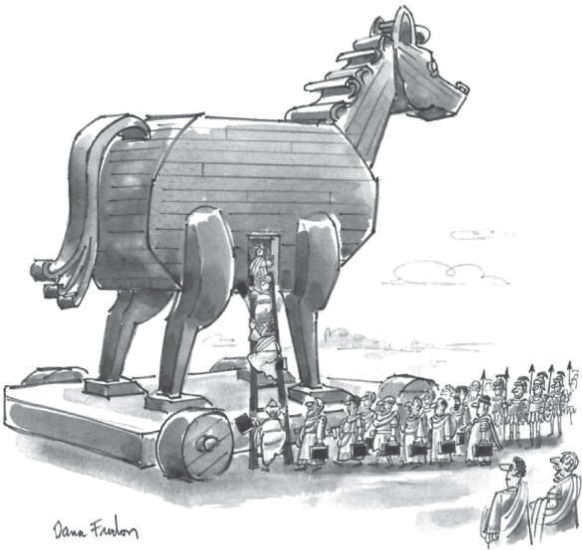
“We're going to try to negotiate first.”
Dana Fradon © 1992 from The New Yorker Collection. All Rights Reserved.
After you write a book about negotiation, and it turns out that, yes, it works in the real world—enables people to get what they want more often, facilitates deals and partnerships, ends stalemates, heals wounds—why change it at all, why rewrite it, why update it? Because Harry Truman was right. Because in practicing what I preach, in teaching, in one after another real-life experiences, my approach evolved, was refined, got better, and became even more effective.
In responding to these situations and countless others, I practiced and imparted the Power of Nice. But in each case the Power of Nice evolved, the tools were sharpened, the outcomes enhanced. Moreover, whether because of feelings of inferiority due to gender, age, culture, or experience, people who found themselves disadvantaged in negotiations, who felt they lacked power, utilized our systematic approach and became empowered. And, amazingly enough, there were successful negotiators who gained a whole new sense of empowerment by being systematic.
And in the course of those negotiations, and reflecting afterward, I continued to learn, and this book now reflects that learning. For example, the concept of WIN–win, or Big Win–Little win, is modified to “maximizing your win”—you get the maximum you can achieve at the time, but the other side doesn't leave the table in defeat.
What used to be the Preparation Planner is now the Preparation Checklist. It's a more streamlined, two-step system—Information Gathering Steps and Action Planning Steps—that facilitate the preparation process. Additionally within the Checklist, items such as the importance of knowing your bottom line, or, as described in the Checklist, your Walkaway, receive new emphasis. Also, the practice of Scripting has emerged to be so important to negotiation, with so much influence over outcomes, that it is now a step unto itself.
In this new version of the book, you will find some older stories updated, some older ideas modified, and some brand new stories and anecdotes that illustrate and teach today's Power of Nice. The systematic approach has evolved and, in total, is even more effective in more situations, more challenges, in more aspects of business and life. You will see the system at work. Most of all, you will find more than power; you will find empowerment. And nothing is nicer.

“We're going to try to negotiate first.”
Dana Fradon © 1992 from The New Yorker Collection. All Rights Reserved.